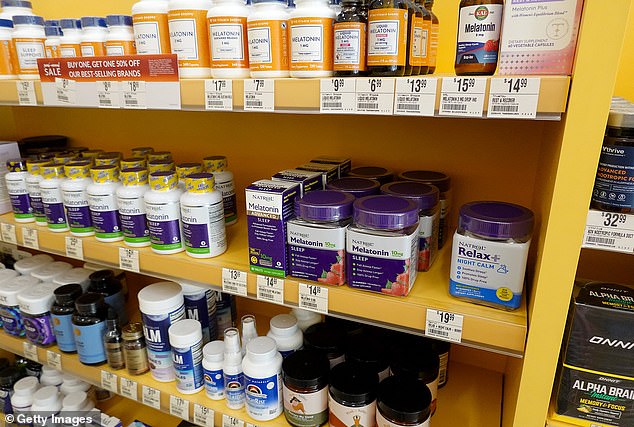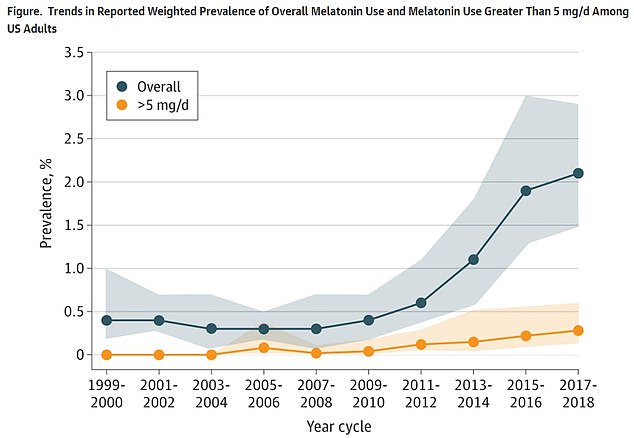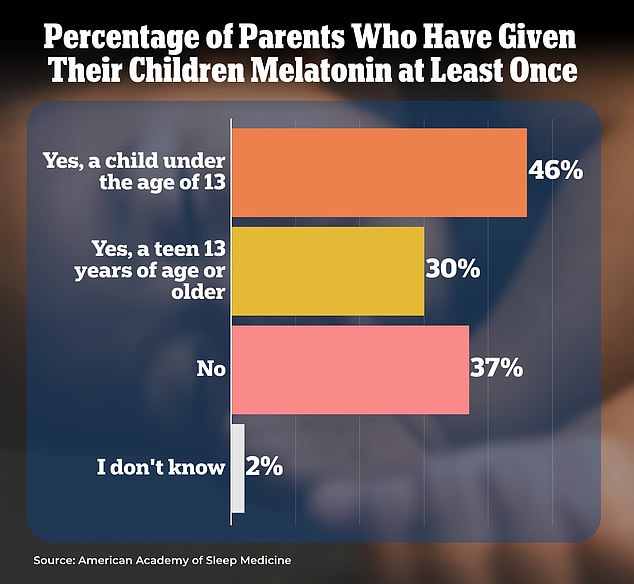Are you taking TOO MUCH melatonin? Experts reveal safe levels of the sleep supplement – as two children DIE from overdoses
Experts have sounded the alarm about the sleep supplement melatonin as its use in the US has skyrocketed and led to a spike in overdoses in children.
Melatonin, an over-the-counter sleep supplement, has exploded in popularity in recent years. Estimates suggest adult use has quadrupled, and more than half of parents have given it to their children.
The vitamin pills – available for $10 per bottle of 30 pills – are said to mimic the effect of natural melatonin, a hormone produced by the body in response to darkness.
The substance tells the brain that it is time to sleep by slowing the heart rate and lowering blood pressure.
However, melatonin products, which are not regulated by federal authorities, often contain much higher doses of the active ingredient than the labels suggest.
The supplement has been linked to a 500 percent increase in childhood overdoses over the past decade.
Sleep experts have warned that demand for the supplement has 'spiraled out of control' – and in excess, adults and children could be at risk of nausea, vomiting, dizziness, poor cognition, changes in heart rhythm and even dementia.
The graph above shows the increase in the number of children overdosing on melatonin

In the US, melatonin supplements are available over the counter as a dietary supplement – including in kid-friendly gummies – without a prescription
Additionally, experts say that even if the amount matches what it says on the package, people tend to use too much.
Dosages vary depending on the brand, but doctors told DailyMail.com that adults should stick to five milligrams per day. On Amazon, however, the bottles for sale claim to deliver 60 milligrams in one tablet – more than 10 times the recommended amount.
Children, meanwhile, should stick to 0.3 to one milligram.
A 2022 report from the Centers for Disease Control and Prevention (CDC) found that the number of children hospitalized after taking melatonin increased 530 percent between 2012 and 2021.
The data also showed that two children died from an overdose of the supplement. Both children were under two years old, the youngest only three months old.
It's not clear exactly what happened in the body to cause the deaths, but experts have suggested that heart rhythm problems are the biggest cause.
Last year, researchers at the University of Colorado Boulder analyzed data from 993 children aged one to 13 years old and found that use of the hormone increased significantly with age.
Parents reported that almost a fifth of children (19.4 percent) between the ages of 10 and 13 took the supplement. In addition, 18.5 percent of children aged five to nine had used it, their parents said.
Lead author Dr. Lauren Hartstein, a fellow in the Sleep and Development Lab at CU Boulder, said, “We hope this article raises awareness among parents and physicians, and sounds the alarm to the scientific community.
'We are not saying that melatonin is necessarily harmful to children. But much more research needs to be done before we can say with certainty that it is safe for children to use it long-term.'
Additionally, a poll from the American Academy of Sleep Medicine (AASM) found that 46 percent of parents have given their children under the age of 13 melatonin at least once.
Melatonin is a hormone that determines how sleeping or awake people feel.
The hormone is produced in the pineal gland in the brain and its release into the body is controlled by light.

The number of Americans using melatonin quadrupled between 2009 and 2018, a survey shows, with more than two percent of respondents using the drug in 2017 or 2018.

A poll from the American Academy of Sleep Medicine found that nearly half of adults say they have given melatonin to children under 13 at least once.
During the day, when the eye absorbs light, melatonin levels in the body are low and as a result we feel awake.
But when darkness decreases and the amount of light absorbed by the eye decreases, more melatonin circulates through the body.
Melatonin prepares the body for sleep by slowing the heart rate, lowering blood pressure and changing the way heat is stored. All this makes people feel sleepy.
The hormone is classified as a supplement, meaning it is not regulated by government agencies.
It means that products often contain much higher dosages than stated on the labels, which can cause excessive sleepiness, stomach problems, headaches and in extreme cases, high blood pressure.
Last year, a study found that about nine out of 10 store-bought supplements were incorrectly labeled.
For example, one melatonin supplement contained 347 percent (4.5 times) as much of the hormone as stated, while another contained no melatonin at all and was instead made from CBD.
Dr. Chelsie Rohrscheib, a neuroscientist and sleep expert at Waspertold DailyMail.com: 'The only way to ensure your melatonin dosage is accurate is to get a prescription for melatonin, which is more closely monitored than over-the-counter supplements.'
According to CDC data, melatonin overdose accounted for nearly five percent of all child poisoning cases in 2021, up from 0.6 percent in 2012. It was the most commonly ingested substance among children reported to national poison control centers.
Although the vast majority of cases reported to poison control were asymptomatic, approximately 84 percent of the more serious symptoms involved the gastrointestinal, cardiovascular or central nervous systems.
Although a melatonin overdose is rarely fatal, more severe cases can cause very low blood pressure, disorientation and tremors.
“Taking too much melatonin can cause excessive sleepiness and dizziness, poor or abnormal sleep, vivid or unpleasant dreams, poor daytime functioning, decreased mood and poor cognition,” said Dr. Rohrscheib.
'Very high amounts of melatonin can lead to nausea, vomiting, headache, dizziness and confusion.'
'If you feel abnormally dizzy during the day or your sleep deteriorates, or if you develop unexpected symptoms such as nausea, headaches and dizziness, this is a sign that you have been taking too much melatonin.'
Vomiting is a common side effect of melatonin poisoning, and when your child starts speaking slurred, it's time to go to the emergency department.
There is no strong existing research on the long-term effects of melatonin. However, experts fear that regular use of the drug could have some negative side effects, and it could even increase a person's risk of developing dementia in old age, according to a study published in JAMA.
The researchers in that study warned that Americans who “self-medicate” at high doses over a long period of time put themselves at risk for short-term side effects, including fatigue, dizziness, headaches and more serious long-term health consequences. especially if taken with other medications.
They also said the spike is “a crazy situation that has gotten out of control.”
Dr. Cydney McQueen, a pharmacist in Kansas City, Missouri, told the American Pharmacists Association that adolescents should not use melatonin “because it is used by the body to produce certain changes associated with puberty.”
“There are no medications recommended for long-term use for insomnia in children or adults,” Dr. Jennifer Martin, a professor at the University of California, Los Angeles, told JAMA.
“We always try a non-drug approach first, and that works for most people.”
Because the supplement may contain so much more melatonin than the labels suggest, experts recommend starting with the lowest possible dose.
'Only very low doses are needed to give a big boost to the amount of melatonin our bodies already produce,' said Dr McQueen. 'A dose of 0.3 to 1 mg is suitable, especially for children. Those doses may also be appropriate and effective for most adults, although up to 5 mg may be used.”
'Most sleep problems in children can be solved by changes in lifestyle and environment. If your child has trouble sleeping, it's best to talk to their pediatrician before giving them melatonin,” says Dr. Rohrscheib.
